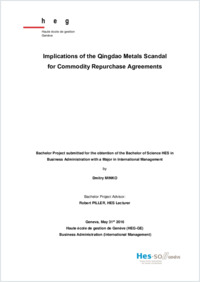Implications of the Qingdao metals scandal for commodity repurchase agreements
SONAR|HES-SO
- Minko, Dmitry
- Piller, Robert (Degree supervisor)
-
2016
87 p.
Mémoire de bachelor: Haute école de gestion de Genève, 2016
English
In May 2014, it was discovered that Dezheng Resources, a Chinese trading company, had multiple warehouse receipts issued for metal stored in the ports of Qingdao and Penglai in Shandong province. Approximately 400’000 tons of alumina, aluminium and copper worth around $380 million were used to obtain $4.2 billion in financing from 18 Chinese and 7 international banks. The fraud was discovered in the course of a government corruption investigation of a Party official. The warehouses have been put under lockdown and have not reopened since. A large part of the financing had been done in the form of commodity repurchase agreements, or repos. These instruments are ownership structures, in which title to the goods and risks pass from the trader to the financier for the duration of the transaction, as opposed to secured lending, in which the goods are pledged to the lender who has a security interest in them. Among the many lawsuits that followed the scandal, the most prominent one was Mercuria v Citibank that was expected to be a test of a key principle of repos, that of the true sale. The objective of this report is to study the consequences of the scandal for commodity repo financing. We start by examining the functioning of these instruments and the context in which the scandal happened. Based on that knowledge, we analyze how Qingdao has affected the use of repos and draw up recommendations regarding the legal and operational aspects of setting up these deals. We find that while in Mercuria v Citibank the issues of true sale and whether it is possible to contract out of attornment to effect delivery were not considered by the judge, the repo structure as such was upheld and remains fundamentally viable. In addition to complying with true sale, the structures should be reviewed by lawyers to ensure that they work across the jurisdictions governing the sale and repurchase contracts and that of the country where the goods are located. In order to reduce the risk of fraud, the lenders should have visibility over the goods’ origin and engage in financing of trading flows that serve to satisfy a real industrial or commercial demand, conduct due diligence on counterparties and warehouses, make use of collateral management agreements and actually visit the storage locations. It is critical not to deal on documentary basis only, but to be aware of the reality of the goods one acquires and the risks to which they are exposed.
- Language
-
- English
- Classification
- Economics
- Notes
-
- Haute école de gestion Genève
- International Business Management
- hesso:hegge
- License
- License undefined
- Identifiers
-
- RERO DOC 278182
- RERO R008563878
- Persistent URL
- https://folia.unifr.ch/global/documents/314702
Statistics
Document views: 1073
File downloads:
- Dmitry_MINKO_Bachelor_Thesis_Final.pdf: 820
